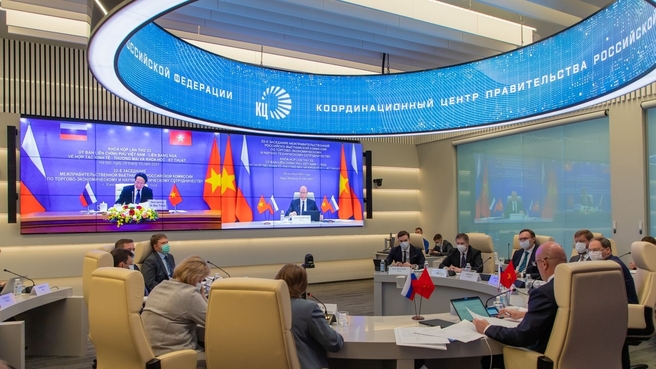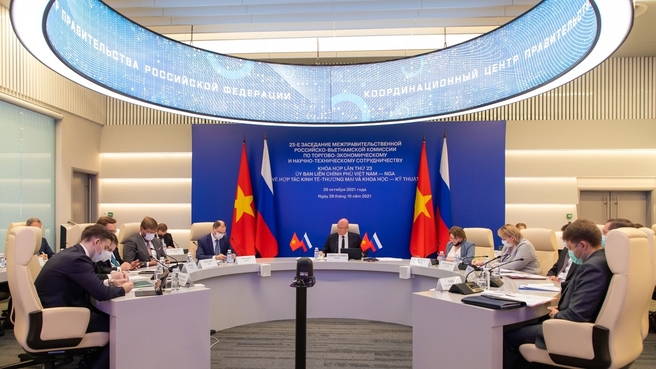Deputy Prime Minister Dmitry Chernyshenko and his Vietnamese counterpart, Le Van Thanh, held talks within the framework of the 23rd meeting of the Intergovernmental Commission on Trade, Economic, Scientific and Technical Cooperation, which followed expert consultations between the two countries’ government agencies and companies.
Deputy Prime Minister Dmitry Chernyshenko and his Vietnamese counterpart, Le Van Thanh, held talks within the framework of the 23rd meeting of the Intergovernmental Commission on Trade, Economic, Scientific and Technical
The Russian participants included the Russian Ambassador to Vietnam, senior officials of the ministries of economic development, foreign affairs, trade and industry, energy, finance, education and science, and agriculture, the Federal Service for Veterinary and Phytosanitary Supervision (Rosselkhoznadzor), the Bank of Russia, the Presidential Executive Office, the Federal Service for the Oversight of Consumer Protection and Welfare (Rospotrebnadzor), the Federal Agency for the CIS Affairs, Compatriots Living Abroad, and International Humanitarian Cooperation (Rossotrudnichestvo), the Russian Direct Investment Fund (RDIF), Rosatom, the Russia-Vietnam Business Council and business associations.
The Vietnamese delegates included the Vietnamese Ambassador to Russia, representatives of the ministries of industry and trade, foreign affairs, agriculture and rural development, planning and investment, public security, science and technology, health, finance, labour, the State Bank of Vietnam, and other concerned agencies.
During the 23rd meeting of the intergovernmental commission, the sides discussed the implementation of the decisions of the 22nd meeting plus areas and measures to enhance the effectiveness of bilateral cooperation.
The participants pointed out that political exchanges and contacts between Russia and Vietnam, especially at the high level, were maintained in the online format despite the negative influence of the COVID-19 pandemic. Effective cooperation was maintained in areas of mutual interest, such as energy, oil and gas, industry and agriculture.
Dmitry Chernyshenko noted that today’s meeting of the Russian-Vietnamese Intergovernmental Commission was an important stage in preparations for the Vietnamese President’s visit to Russia, scheduled for late 2021.
“Trade, economic, scientific, technological, military-technical and humanitarian cooperation has been developing apace. Earlier this year, we marked the 5th anniversary of the coming into force of the Free Trade Agreement between the EAEU and Vietnam. This is an important landmark that calls for a thorough analysis of the results achieved in mutual trade between Russia and Vietnam. Investment collaboration is in progress. Russia is implementing investment projects in Vietnam, while its Vietnamese partners are actively investing in the Russian market,” said the Deputy Prime Minister of Russia.
“The Vietnamese attach great importance to the comprehensive partnership with the Russian Federation. We are ready to promote further cooperation in various areas, including in science and technology, and trade,” Deputy Prime Minister of Vietnam Le Van Thanh said.
“On the one hand, trade has been growing: in 2020, it increased by more than 15 percent to $5.67 billion; during the first seven months of 2021, trade has grown by 24 percent to $3.6 billion as of now. But the volume of imports from Vietnam exceeds Russian exports. For example, the difference amounted to 150 percent in 2020, and to almost 200 percent during the first seven months of 2021,” Dmitry Chernyshenko explained. He also mentioned the lack of any current large-scale joint projects.
During the meeting, the Russian side focused in particular on barriers preventing the further growth of Russian exports; Russia also enlisted Vietnam’s support for implementing joint projects in energy, industry and agriculture. The sides agreed on an early completion of all domestic procedures related to the construction of the Centre of Nuclear Science and Technology in Vietnam so as to sign a contract on drafting a feasibility study in early 2022.
The sides commended the joint efforts to fight the COVID-19 pandemic. Russia reaffirmed its readiness for prompt and large-scale priority deliveries of the Sputnik Light vaccine to Vietnam after the latter registered the medication. A reserve of 8 million doses of the vaccine has already been set aside. At the same time, agreements have been reached on the supply of more than 60 million doses of Sputnik V and Sputnik Light to the country.
The deputy prime ministers also highlighted the successful introduction of the Mir card into Vietnam’s payments system. Currently, nearly 40 percent of its relevant infrastructure accepts the Mir cards, but there are plans to increase this figure to 80 percent by the spring of 2022. This will make it easier and more comfortable for Russian tourists to stay in Vietnam.
Following the meeting, Dmitry Chernyshenko and Le Van Thanh signed the final protocol of the 23rd meeting of the Russian-Vietnamese Intergovernmental Commission.











